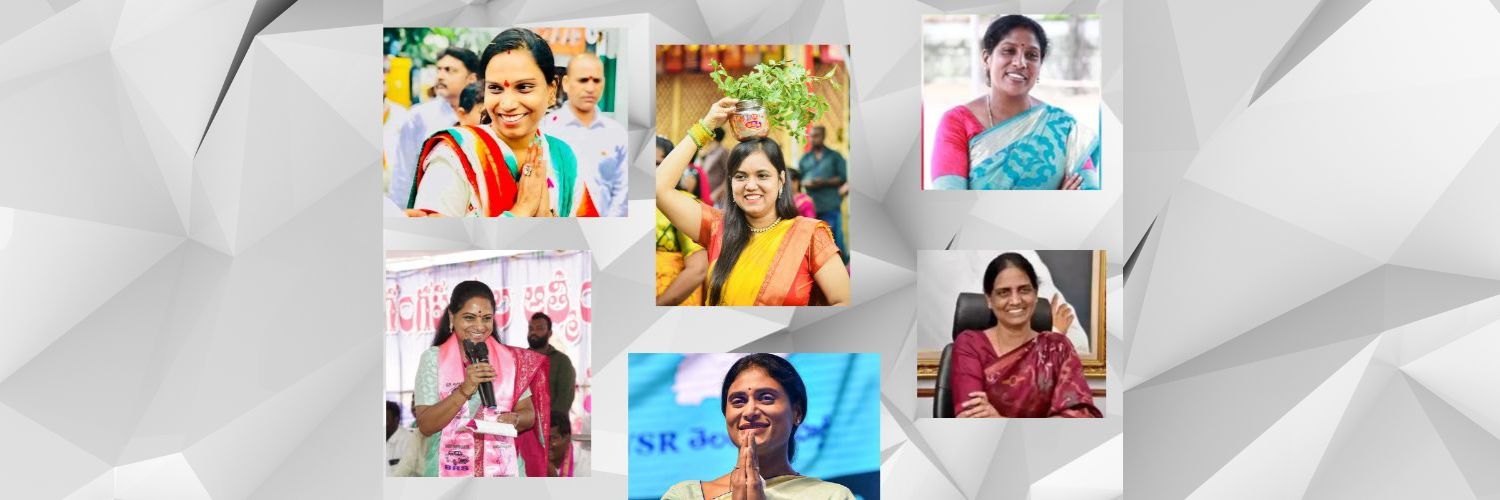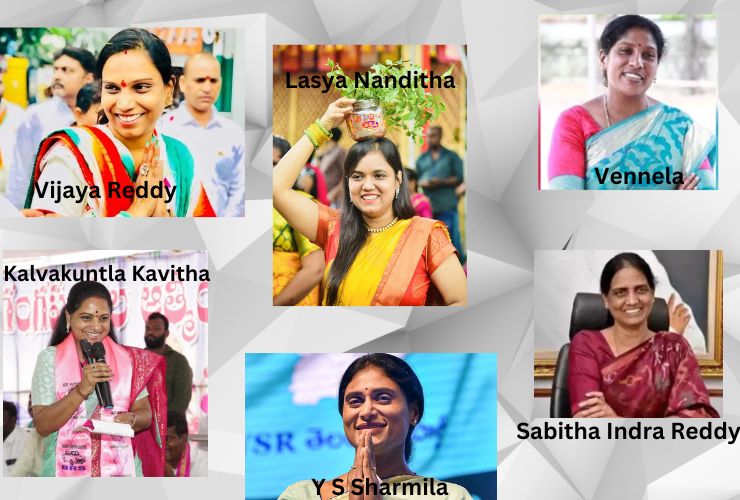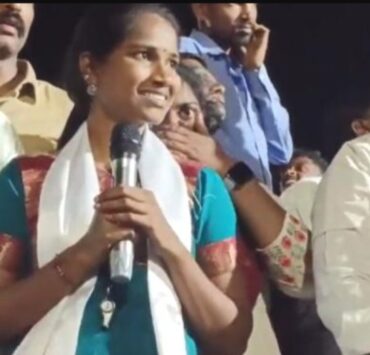
By Vanaja C

Women make up less than 10 percent of contestants in the 2023 Telangana Assembly elections. Vijaya Reddy is one of them. She is contesting from the Khairatabad constituency of Hyderabad on the Indian National Congress ticket. It is a triangular fight against a minister in the current Bharat Rashtra Samithi (BRS) government and a former MLA from the Bharatiya Janata Party. The Khairatabad seat is a very prestigious one as it falls in central Hyderabad. Both her opponents will do their best to win the seat, and it is going to be a tough fight. However, she is not afraid, as she fought a bigger battle to get into this contest. It is interesting to know the story of Vijaya Reddy and other such women in this election.
It is well known that most women in Indian politics, starting from Indira Gandhi, have found their place through “hereditary politics”. But that does not make it any easier for most women with that political inheritance who want to come into politics. They first need to fight patriarchy at home.
It is very common in this part of the country for the wife of a deceased MLA to win his seat in the by-election, and sometimes the opposition parties do not even field their candidate to contest, as a mark of respect to the deceased colleague. However, a wife contesting for her deceased husband’s seat will have the advantage of the sympathy vote only the first time. She needs to build her career carefully if she wants to continue in politics. She needs acceptance in three places – at home, in the party and with the people.
Sabitha Indra Reddy, wife of the late Indra Reddy and the longest serving woman minister in erstwhile Andhra Pradesh and Telangana, was one such candidate. Though she won with the sympathy vote the first time, she won even after she changed constituencies, and continued to win every election she contested. The only time she stepped aside was for her son. When he lost, she got back in the game and is now serving as a minister in the outgoing government.
But if the wife is not interested in politics, or she has a son who is already interested in politics, then the son, and not the daughter, will be the natural choice of both the party and the family. The daughter’s name pops up only when both wife and son are not interested in politics. And deceased or not deceased, if both son and daughter are interested in politics, the daughter is never the choice in the family itself. It is the same way that succession works in the country in property and business.
This is what makes the case of Vijaya Reddy and those of some other women interesting. Vijaya Reddy is the third of the four daughters of the late P Janardhan Reddy, a five-time legislator from the Congress Party in the Khairatabad constituency and a minister in erstwhile Andhra Pradesh. Janardhan Reddy came from a very humble background, established himself as a trade union leader and eventually became a very popular leader. When he died suddenly in 2007, his son Vishnuvardhan Reddy was the natural choice to contest from Khairatabad where he won with a huge majority due to the sympathy wave. Vishnuvardhan later moved to another constituency and won.
Meanwhile, Vijaya Reddy developed an interest in politics but did not get support from the party or her brother. She initially fought as an independent and later joined YSR Congress Party. She contested from her father’s constituency but did not win. In 2015, she moved to the Telangana Rashtra Samithi (which became the BRS in late 2022) and went on to become a corporator. Last year she joined the Congress Party where she wanted to contest from her father’s constituency. And there lies the problem.
The Congress Party in Telangana follows the “one ticket to one family” formula with few exceptions. In this case, either the brother or the sister would get the B form to contest the election. Both siblings tried very hard, lobbied and used their political connections. Finally, the party chose Vijaya Reddy over her brother. The disappointed Vishnuvardhan Reddy left the party to join the BRS. It is rare to see sisters gain the upper hand over brothers in politics.
The other case is of the daughter of the revolutionary singer-balladeer Gaddar. Gaddar had a son, Surya, and a daughter, Vennela. Those who have seen Gaddar at close quarters know that all his political hopping in the last decade of his life had one purpose – to get a career for his son in mainstream politics. While Gaddar has had a chequered history with electoral politics, his last public appearance at a political meeting was one held in July by Congress and addressed by Rahul Gandhi. When he died suddenly in August, the party claimed him due to his popularity which had not waned despite his renunciation of revolutionary politics. After the death of her father, Vennela showed an interest in mainstream politics and she was chosen over her brother. Rahul Gandhi, who was in touch with the family at the time of Gaddar’s demise, was behind that decision.
Interestingly, Vennela is contesting the Secunderabad Cantonment seat against another woman candidate. Lasya Nanditha from the ruling party also got the opportunity due to the demise of her father, the late G Sayanna. Lasya Nanditha has been active in politics and once served as a corporator. This SC reserved seat was the only one in the city and most sought after, and it has many strong contenders. The party settled the conflict by choosing the daughter of the deceased MLA. So now both these women are fighting with each other, claiming the legacies of their late fathers.
Whether or not these women win these seats, they have already won a battle at home. However, not all the stories of daughters have such positive endings. Telangana has two more famous daughters, both sidelined by their families. One is the daughter of Telangana’s chief minister K Chandrashekar Rao and a sitting MLC, Kalvakuntla Kavitha. The other is YS Rajasekhar Reddy’s daughter, YS Sharmila.
Kalvakuntla Kavitha, like her brother Kavakuntla Taraka Rama Rao (KTR), was living in the USA when the movement for separate statehood began. She moved to India and joined her father in the movement to work in the cultural front, floating an organisation Telangana Jagruthi (awakening Telangana). Her programmes were a huge boost to the movement for Telangana culture and pride. Much later, KTR also shifted base from the USA and joined the movement. He contested elections and won even before the state was formed. Kavitha was a popular name then, with political aspirations. She never had any qualms about it.
But when Telangana was formed in 2014, Kavitha was not chosen for an assembly ticket to have a political career in the state. Instead in the Lok Sabha elections in 2014, she was given the ticket for the Nizamabad seat, which she won. But she lost in the 2019 elections. Despite being an MP, Kavitha was never given any importance in party affairs. She was kept away from the party and KTR was chosen to be the inheritor of their father’s legacy. This led to a rift in the family, though it was not made public and the siblings never fought openly. Kavitha was always unhappy with the way she was treated in the party and in the family. When the liquor scam was unearthed, the family fought and allegedly made compromises to keep Kavitha out of jail, but politically she was made invisible. She has not been given a ticket in the current elections. Had it been a male member who faced such allegations, would the family and the party have responded similarly? Would they not continue to keep him in the leadership and fight, as was done with YS Jagan Reddy?
Then there is the case of YS Sharmila. She had never shown an interest in politics while her father was alive. But when her brother Y S Jagan went to jail in the “quid pro quo” scam, Sharmila immediately jumped in, organised padayatras and protests, and played a key role in keeping the party afloat until her brother got out after 16 months in jail.Once YS Jagan got out, Sharmila started losing importance and eventually she became an outsider both in the party and in politics. She floated her own party but has been confined to Telangana as her brother YS Jagan Reddy, chief minister of Andhra Pradesh, has ensured that she cannot play any role in Andhra politics. Sharmila has decided not to contest in these elections and, after a failed attempt to merge her party with Congress, asked her party cadre to support Congress. Rumour has it that she has been promised a Rajya Sabha seat if the Congress Party comes to power in Telangana.
Both Kavitha and Sharmila are examples of women whose battles have begun at home despite their surnames. But knowing them, one can say that both will wait for the opportunity and will not pass up any chance to make a comeback in the future.
Whether they win or lose at home and in elections, it is interesting to see that daughters are fighting for their place at the table in hereditary politics. It is not a cake walk for these women. The feudal notions of what the woman’s place is, and who should lead the family or politics or business, continue to rule.
C Vanaja is an independent journalist and filmmaker.
Edited by Sandhya Srinivasan




